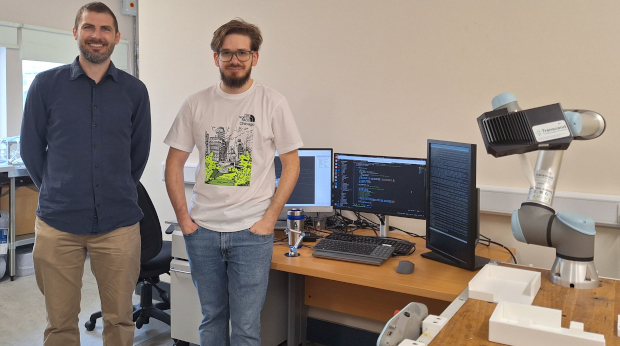
Robomate aims to transform the SME manufacturing sector
In association with Research Ireland
The manufacturing sector in Ireland is one of the highest performing sectors in the country, accounting for almost 40% of GDP. But unlike other manufacturing powerhouses, like Germany, South Korea and China, Irish manufacturing hasn’t yet fully embraced robotics, which could transform the sector.
“Irish manufacturing is very manually driven. There are, of course, different reasons for that. Big car manufacturing countries like France and Germany have long since implemented automation and robotics, but the type of manufacturing we do in Ireland – pharma and med tech – doesn’t yet rely on robotics as much. We do automate processes, and the people who do that are very skilled at it, but we don’t have the same volumes of the automotive industry, for example. Larger organisations are certainly looking at robotics, but for our project, we zeroed in on SMEs,” explains Philip Long, research team lead of Robomate.
In Ireland, SME manufacturers are primarily reliant on manual labor, but with the huge labour shortage in Ireland currently, why aren’t smaller businesses looking to automation?
Philip explains that there are a number of barriers. SMEs typically win smaller contracts, which last around six months, but the return on investment for the average robotic cell takes between 18 months and two years. “Financially, it doesn’t make sense for SMEs to automate these tasks. So what they tend to do is hire people for that particular contract, and if more orders don’t come, they may have to let go people, which isn’t ideal for everyone involved.”
The classic robot implementation in a factory today in Ireland is housed in a cage, says Philip. “If someone wants to enter, they have to open a door, and that door is connected to what we call an interlock. As soon as you open it, the robot stops, and then you can go in and it’s safe. The difficulty with this is that it takes a lot of floor space, but also, every time the person wants to go in there, the robot, and the work, actually stops. So it’s expensive, it takes floor space, and it’s a lot of infrastructure.”
Philip and his team are focusing on a newer type of robot implementation – human centred robotics, where the robots work alongside humans and learn from them. “We’re pitching a robotic system, which is safe, but also that SMEs and smaller companies can program and reprogram, on the fly.”
SMEs would purchase or lease the Robomate system to do one particular task or build one specific product. If the company changes the product, they can reprogram the system quickly without a high level of expertise. “Our vision is, rather than having six workers building a part, the company could have those workers supervising, for instance, 12 robots. If the robot makes a mistake, the person intervenes and corrects it, like they’d do with a human worker.”
What makes Robomate different is that the programming is not done with code, it’s what Philip calls learning from demonstration. “What happens is that you show the robot what to do, and the robot copies what you’re doing. Then if the robot makes a mistake, you intervene and you show it again, in effect, reprogramming it,” explains Philip. “The robot is able not just to repeat it, but also understand the underlying task. So if the object moves or if there’s any variation in the task, the robot will still be able to repeat the task.”
Making standards
Philip and his team are currently working with the National Standards Authority of Ireland to determine the system’s safety processes, and they are engaging with stakeholders.
“The goal will be that SMEs could use these systems to automate tasks where before they’d relied on labour. This means that if you’re a small company and a bigger company says ‘we need to make 2,000 of these parts’, the SME says, ‘yes, we can do that’. And they set up the line, and then somebody quickly programs the system to do the assembly task in the background. In this way it can be scaled up or down seamlessly, without a huge financial investment.”
A user study of the Robomate system showed how easy it is for people who are not experts in robotics or automation to program the robot. “We did a small user study with 10 people, some of whom had never interacted with a robot program before. What was interesting was that the people who had never programmed a system completed the task just as well as experts who had been working with robots for years. Together with Technological University (TU) Dublin, we’re working to improve the human machine interface a little bit more so we can do more complex tasks. But the results so far have been encouraging.”
Looking at the bigger picture, Philip and the Robomate team think this system may allow Ireland to be more competitive globally when it comes to the manufacturing of lower cost or consumer products.
“Right now, it’s a constant struggle for a lot of companies to keep manufacturing in Ireland. Looking down the line, we need to boost that labour productivity even more, so that one worker, controlling these robots or supervising these robots, is amplifying their capabilities and knowledge. There is an opportunity for Ireland and Europe to re-shore some of these critical industries and keep manufacturing local.”
Philip and his team in Atlantic Technological University in Galway are collaborating with TU Dublin, and are also engaging with the Irish Manufacturing Research in Mullingar.
Robomate is currently in the Grow Phase of the National Challenge Fund, a €65 million research fund established under the Government of Ireland’s National Recovery and Resilience Plan (NRRP), funded under the EU’s Recovery and Resilience Facility, coordinated and administered by Research Ireland.
It joins four other teams in the Future Digital Challenge group, which is focused on transformational societal and economic impact from disruptive digital technologies. These four teams will have the opportunity for additional funding in the final phase of the programme, where prize funding of €1 million is on offer.






Subscribers 0
Fans 0
Followers 0
Followers